2021 REPORT Annual
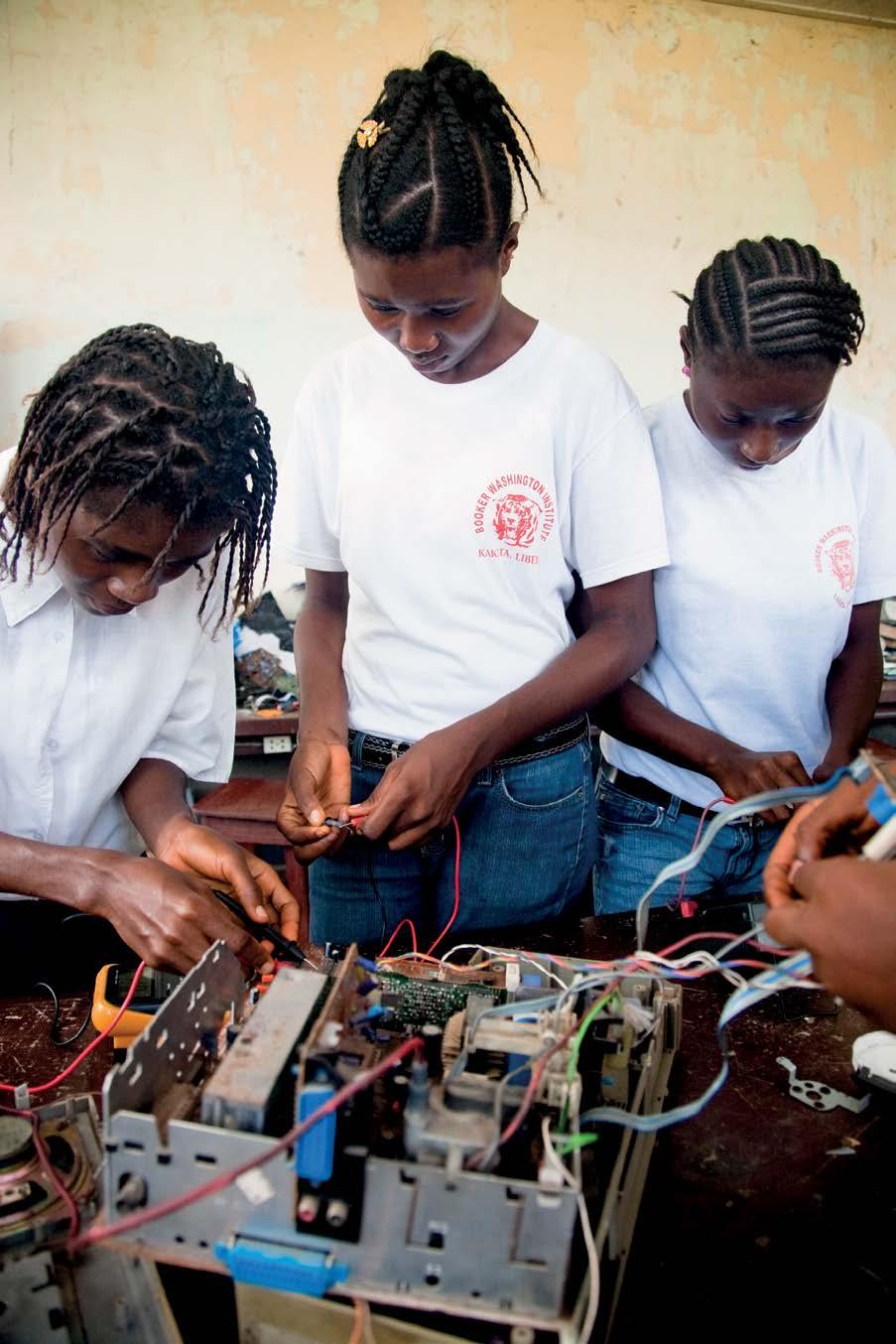
The Forum for African Women Educationalists (FAWE) is a membership- based pan-African Non-Governmental Organization that operates through 34 National Chapters in sub-Saharan Africa to promote girls’ and women’s education. FAWE’s vision, mission and goal are all resolute on the well-being of girls’ education. FAWE’s Regional Secretariat is based in Nairobi, Kenya.
FAWE National Chapters: Benin, Burkina Faso, Burundi, Cameroon, Chad, Comoros, Congo, Ethiopia, Gabon, Ghana, Guinea, Kenya, Liberia, Madagascar, Malawi, Mali, Mozambique, Namibia, Nigeria, Democratic Republic of Congo, Rwanda, Senegal, Seychelles, Sierra Leone, Somalia, South Sudan, Swaziland, Tanzania, The Gambia, Togo, Uganda, Zambia, Zanzibar, and Zimbabwe.
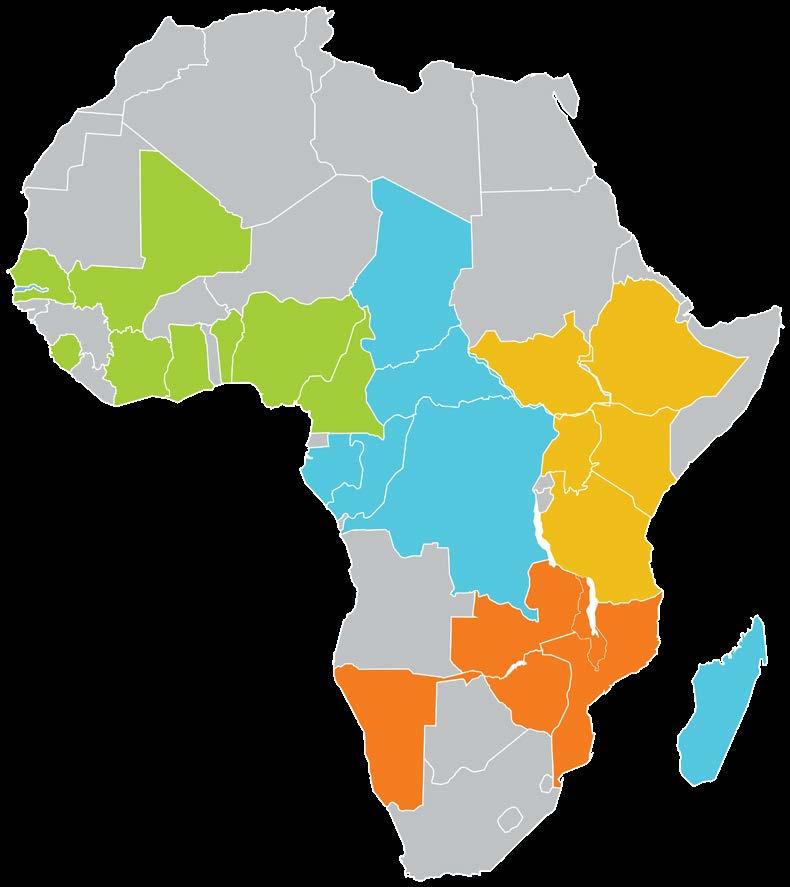
COPYRIGHT: This publication may not be reproduced for any purposes without prior written permission from FAWE. FAWE cannot be held responsible for any inaccuracies. Parts of this publication may be copied for use in research, advocacy, and education, provided that the source is acknowledged.
©FAWE Forum for African Women Educationalists (FAWE).
2 FAWE Annual Report 2021
Table of Contents
Executive summary 1
Acknowledgements 3
Preamble 4
Acronyms 5
1.0 FAWE at the heart of girls’ access to education and training opportunities 6
1.1 Enabling access to quality education 6
1.2 FAWE Rwanda scholars excel in academics at university 6
1.3 The Higher Education Access Programme (HEAP) 7
1.4 Sixty students graduate with certificates in higher education 7
1.5 Scholarship Entrepreneurship Fund 8
1.6 Commonwealth Scholarships 9
1.7 Supporting girls and women through skills training 9
1.8 Imparting political leadership skills in the next generation of leaders 10
1.9 FAWE implemented Women in Political Participation (WPP) 14 launches the Intergenerational Mentorship Programme
1.10 Youth empowerment through Sexual Education 15
1.1.10.1 Break Free Alliance (BFA) project 16 1.1.10.2 Make Way Programme (Dutch Government Funds) 16 1.1.10.3 Sexual Health and Reproductive Education (SHARE) 17 1.1.10.4 Tamatisha! 17 1.1.10.5 Forum for African Women Educationalists Zambia Chapter (FAWEZA) 17 launches the Make Way Programme
2.0 Integration of gender-responsive approaches in education for transformative societies 20
2.1 Girls taking their rightful place in STEM 20
2.2 STEM teachers in Uganda awarded 20
2.3 Gender Responsive Pedagogy (GRP) and Tuseme Models 22
3.0 Advocacy and Policy Engagement 24
3.1 FAWE, a Pan-African thought leader 24
3.2 Leveraging on partnerships to advocate for girl child education 24
3.3 Data Driven Advocacy for Girls in Emergencies (EiE) 25
3 FAWE Annual Report 2021
4.0 Institutional Strengthening and Capacity Building 26
4.1 Strengthened Capacity of FAWE National Chapters and Regional Secretariat Team 26
4.1.1 FAWE South Sudan (FAWE SS) is back! 26
4.1.2 FAWE GRP training for FAWE Regional Secretariat Staff and National Chapters 26
4.1.4 Technical training in website management and 27 communications strategy development
4.1.5 Francophone spirit ignited in Anglophone Speakers 27
4.2 Resource Mobilization 28
4.3 Communication for enhanced visibility 29
4.4 Alumni engagement 31
4.4.1 FAWE alumni selected as GPE Global Youth Champion 31
5.0 Research and Knowledge Management 32
5.1 Enhancing data management 32
5.2 Research and Documentation 33
5.2.1 Higher education Access Program (HEAP) 33 5.2.2 Re-entry Studies and Policy Briefs in Namibia, Senegal, Tanzania and Malawi 33
5.2.3 Women in Political Participation Situation Analysis – Tanzania and Kenya 33
5.3 FAWE migrates to the cloud! 33
6.0 Learnings from 2021 35
4 FAWE Annual Report 2021
Martha R.L Muhwezi Executive Director

FAWE’s 2021 Annual Report is an overview of the organization’s achievements from January to December 2021, the challenges experienced, lessons learnt and proposals for desired activities for the year 2022. FAWE is committed to her mission of promoting girls’ education and women’s empowerment in Africa by aligning her actions with her 2019-2023 Strategic Plan.
Facilitating access to education and training opportunities for girls remains one of FAWE’s core commitments. More than 1,470 young girls and boys from Ethiopia, Uganda, and Rwanda benefited from scholarships to pursue their studies at secondary and university levels and an addition 19 young women, drawn from various countries in Africa, benefited from scholarships for Master and PhD degrees. In addition, FAWE supported 850 out of school girls and young women through financing and implementing income generating projects in Mali and Tanzania and 183 girls (scholars) in Rwanda supported on entrepreneurship.
FAWE continues to be a thought leader in girls’ education and women’s empowerment in Africa. Leadership is reinforced by the continuous creation of knowledge and publication of research findings that promote the mainstreaming of gender-responsive
approaches in education and contribute to development of policy briefs.
In 2021, teachers in Senegal, Togo, Burundi, Democratic Republic of Congo, and Rwanda were trained in Gender Responsive Pedagogy (GRP) and introduced to FAWE’s Tuseme model. The teachers in Burundi, DRC, and Rwanda further received training on School Related Gender Based Violence (SRGBV).
It is important to note FAWE’s focus on girls’ education in Science Technology Education and Mathematics (STEM). FAWE awarded 40 STEM teachers in Uganda for their commitment in supporting more girls take up STEM subjects and for being gender responsive in their teaching methodologies. Over 196 teachers and 5,300 students from Kenya and Nigeria were trained on basic programming and digital skills.
The year 2021 was also a year of expansion for FAWE, both programmatically and financially. FAWE has expanded her presence on the continent and strengthened the capacity of the National Chapters through various GRP training, coaching on website creation and management, advocacy, resource mobilization and communication strategy development The Alumni network also grew and enhanced its visibility. We have launched several largescale projects ranging from youth empowerment through sexual education to promoting women’s engagement in politics. At least 132 young women leaders benefited from our leadership mentorship program and received tailored training to boost their political careers. FAWE also participated in various international days advocating for effective gender mainstreaming in education sector.
Bridging the gender gap remains a hallmark of FAWE. The organization will continue to work closely with partners and key stakeholders to ensure that young girls and women have access to quality education. Though, the Covid-19 pandemic remains a major challenge to the effective implementation of our projects, FAWE has adopted well thought out and resilient strategies to overcome COVID 19 barriers and, employed deliberate interventions to continue promoting girls’ rights, quality education and equitable access to work opportunities. Our achievements and actions initiated during this year are an ideal starting point to spearhead a new year full of promises for women’s empowerment and girls’ education on the African continent.
5 FAWE Annual Report 2021
Ex EC u TI v E Su MMAR y
A CKN o WLE dg EMENT
This Report was developed by the Forum for African Women Educationalist (FAWE) Regional Secretariat (RS); led by the Executive Director, Ms. Martha R.L Muhwezi. The Regional Secretariat would like to thank the FAWE Executive Board, who played a key role in providing strategic guidance and support, in a year that was particularly challenging. We would also like to thank each of our 34 National Chapters for their time, energy, and enthusiasm towards advancing women and girls’ education in Africa.
FAWE in indebted to the financial support of various partners including MasterCard Foundation, Norad, Echidna Giving, Ministry of Foreign Affairs Netherlands (Dutch Government) through the Make Way programme and Break Free Alliance, Embassy of Sweden, Addis Ababa through International IDEA, Ford Foundation, Oxfam Kenya, French Embassy - Senegal, Fondation Paul Gerlin Larjoie (FPGL), Equal Measures 2030, International Development Research Centre (IDRC), UNESCO, EDUFAM, Islamic Development Bank (IsDB), Karanta Foundation, Global Affairs Canada, GIZ and UNICEF.
More gratitude goes out to the whole FAWE Regional Secretariat team for successful implementation of the programmes that are contained in this report. Special thanks to the Communication Officers; Mohamadou Ba and Emily Buyaki, who worked tirelessly on the production of this report and to the Deputy Executive Director and Head of Programmes Teresa Omondi – Adeitan for the detailed review and editorial support. The team captured invaluable lessons and issues pertinent to girls and young women’s education and empowerment in Africa.
.
6 FAWE Annual Report 2021
PREAMBLE
Simone De Comarmond, FAWE Board Chairperson
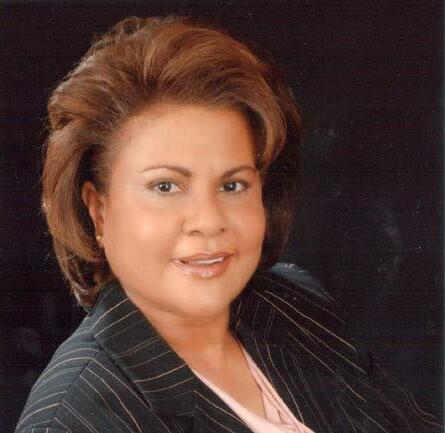
For the past 2 years as the world survives COVID-19 pandemic, FAWE remains stable and continues to adopt resilient strategies to keep the girls’ education agenda alive. Since March 2020, Sub-Saharan Africa has carried a fierce struggle in limiting the spread of the virus. This entailed limited mobility, lockdowns, and other restrictive measures.
Unfortunately, young girls and boys are not only struggling with the virus, but they are also the most affected. They see their future jeopardized and begin to lose hope. FAWE is steadfast and aware that we must be among the organizations that do not only give the young people hope but take deliberate action to save their future and give them a chance to reach their full potential.
The Annual Report 2021 encapsulates the full range of FAWE’s operations and interventions during the year 2021 and it is reflective of an extraordinary year, in which FAWE adapted and responded to the global COVID-19 pandemic. FAWE reinforced her collaboration with Governments, International Organizations and Non-Governmental Organizations (NGOs), while continuing to build strong partnerships with local actors and associations. These partnerships anchored the Organization’s expertise in comprehensive gender responsive mainstreaming and its cross-sectoral interventions.
The continental and international recognition of FAWE’s work continues to grow, thanks to the commitment and dedication of our staff members across our 34 National Chapters and their respective boards. We remain indebted to our partners and donors for the continued support in making FAWE the thought leader on matters education for girls and young women in Africa. We are because you believe in Us.
7 FAWE Annual Report 2021
Hon.
A CR o N y MS
ACERWC
African Committee of Experts on the Rights and Welfare of the Child
AGS African Girls Summit
AU African Union
AU/CIEFFA African Union/ Centre for Girls and Women’s Education in Africa
CCG Country Coordinating Group
CESA Continental Education Strategy for Africa (CESA 16-25)
COVID-19 Corona virus disease of 2019
CSE Comprehensive Sexuality Education
CSO Civil Society Organization
DRC Democratic Republic of Congo
EAC East African Community
EACSOF East African Civil Society Organizations’ Forum
EiE Education in Emergencies
ENAI Ewang’an Nadede Advocacy Initiatives
FAWE Forum for African Women Educationalists
FAWE Kenya FAWEK
FCDO Foreign Commonwealth Development Office
FEMNET The African Women’s Development and Communication Network
GES4CESA Gender Equality Strategy for Continental Education Strategy for Africa
GIMAC Gender is my Agenda Campaign
GIZ Deutsche Gesellschaft für Internationale Zusammenarbeit
GPE Global Partnership for Education
GRP Gender Responsive Pedagogy
HEAC Higher Education Access Certificate
HEAP Higher Education Access Programme.
IFAN The Foreign, Commonwealth and Development Office
INGO International Non-Governmental Organizations
MIC Monitoring and Information System
MREL Monitoring, Reporting, Evaluation and Learning
MTR Mid-term review
NC National Chapter(s)
NGO Non-Governmental Organization
REC Regional Economic Community
RS Regional Secretariat
SHARE
Sexual Health and Reproductive Education
SRHR Sexual Reproductive Health and Rights
STEM Science Technology Engineering and Mathematics
TVET Technical and Vocational Educational and Training Organization
UNHCR United Nations High Commissioner for Refugees
UNICEF United Nations Children’s Fund
UNGEI United Nations Girls’ Education Initiative
UNESCO United Nations Educational, Scientific, and Cultural
WLSA Women and Law in Southern Africa
WPP Women in Political Participation
8 FAWE Annual Report 2021
FAWE AT T h E h EART o F g IRLS ’ ACCESS T o E du CATI o N AN d TRAININ g o PP o RT u NITIES 1.0
Guided by the principles under the first FAWE Strategic Objective, to facilitate access to quality education and training opportunities by girls and women across Africa, for them to develop relevant skills to achieve their full potential in all realms of life, FAWE embarked on several activities and program implementation for the benefit of the girl child.
1.1 Enabling access to quality education
Through her Comprehensive Scholarship Programme, FAWE enables bright but underprivileged students from Rwanda and Ethiopia to enroll, stay in school, complete the school trajectory and transition to the professional world.
Specifically, in the year 2021, FAWE supported 1165 (1059 girls, 106 boys) FAWE/MasterCard Foundation scholars in Rwanda (784 scholars) and Ethiopia (381 scholars). In May 2021, 133 scholars graduated in Ethiopia. 179 scholars from Rwanda completed their university education and are awaiting graduation. University of Rwanda held a graduation in September 2021 and 42 scholars graduated. In Rwanda, out of the 143 alumni who were trained on entrepreneurship, 40 received grants to set up their businesses. In addition, 9 scholars from the University of Rwanda were elected to leadership positions in the University of Rwanda Students Guild, while 3 others were elected to be Baobab ambassadors under the Mastercard foundation.
1.2 FAWE Rwanda scholars excel in academics at university
Excellence continues to characterize FAWE scholars at university level. In the academic year of 20192020, 4 out of 11 best performing students at INES Ruhengeri were FAWE Mastercard Foundation Scholars beneficiaries who scored between 75-85%.
The Mastercard Foundation Scholars Program provides academically talented yet financially disadvantaged young people, particularly from Africa, with access to quality and relevant secondary and university education. The 4 students were each awarded a laptop by the university as a reward for their exemplary performance. In addition to this, 7 out of 12 leaders elected in the INES Ruhengeri Guild Council (2020-2021) are FAWE MCF scholars . Thanks to the leadership training as well as continuous mentorship support provided by the MCF Scholars program, scholars are stepping out into leadership positions.
FAWE Mastercard Foundation Scholars (in graduation gowns) and FAWE Rwanda staff cut a cake to celebrate the graduation ceremony of 42 2019-2020 Alumni cohort who graduated from the University of Rwanda. The event was held in December 2021.

9 FAWE Annual Report 2021
1.3 The higher Education Access Programme (hEAP)
The Higher Education Access Program is an eight-year Program that seeks to enable 300 young women and men from economically disadvantaged regions of Uganda access to education and leadership development, including transition to higher education or to secure employment in sectors that contribute to the development of their communities and the country.
The Program is focused on providing bursaries to academically bright and gifted students from the Northern region including Adjumani, Amudat, Amuru, Kaabong and Pader; Eastern regions including Bukwo, Buyende, Katakwi and Mayuge; and, the Western region, including Buliisa, Bundibugyo, Kanungu and Ntoroko. FAWE continued to support 271 Students taking Diploma and Degree studies in Uganda.
In April, 10 students from Busitema and Mbarara university graduated with degree certificates. Between July and December, 49 students completed their studies with 11 students from Gulu University graduating in September 2021 and the remaining 38 awaiting graduation.

Out of the 49 students that had completed their studies, 13 of them are volunteering as nurses or lab technicians, 13 others are part time teachers, 5 are employed full time while 7 are self-employed. Further, 60 students (30 female, 30 male) who pioneered the Higher Education Access Certificate, a bridging course in Busitema University graduated and are currently enrolled in science-based Degree Courses at Busitema University.
Additionally, two universities, Gulu and Mbarara received accreditation from the National Council for Higher Education to enroll bridging course students.
10 FAWE Annual Report 2021
Photo credit: Stock image
1.4
Sixty students graduate with certificates in higher education
On 27th March 2021, FAWE Uganda held a graduation Ceremony for 60 students (26 Female, 34 Male) who completed the Higher Education Access Program (HEAP) at Busitema University in Tororo – Eastern Uganda.
The ceremony was meant to appreciate and congratulate learners who completed the one (1) year study under the Higher Education Access Certificate program to prepare them to transition into university degree programs. It helped popularize the HEAP Program in Uganda; and clarified fears and expectations about it. The awareness is focused on increasing the number of students taking-up the course in the seven (7) Partner Universities of Busitema, Gulu, Mbarara University of Science and Technology, Lira, Muni and Kabale.
The 60 learners will transition to degree courses in, Bachelor of Medicine & Surgery, Nursing, Agricultural Mechanization and Irrigation, Engineering, Education in Sciences and Languages, Water Resources Management, and Animal Production and Management at Busitema University under the FAWE Mastercard Foundation scholarship. Prior to the graduation ceremony, a two day transition workshop was held and learners were oriented on career selection and success in a professional work environment, understanding institutional rules, regulations and reporting structures, life in college or Higher institutions of learning, mentorship and coordination at different campuses, discipline and building blocks of success with the objective of enabling them to settle down and concentrate on their studies in the next education journey.
After the ceremony, a radio talk show was held at Rock Mambo FM in Tororo district to popularize the Certificate program following completion of the first cohort of learners. Three (3) graduands and the Dean Faculty of Science and Education featured as Panelists. Learners shared their testimonies, experiences about the program and appreciated FAWE and Mastercard Foundation for supporting and enabling them to achieve their dreams. The talk show reached out to over 3 million people in Eastern Uganda.
The event was graced by several dignitaries including officials from Busitema University – The Dean Facility of Science and Agriculture, Quality Assurance: Academic Registrars from Gulu and Mbarara University of Science and Technology, Media, FAWE Uganda staff, mentors and roles models, and the learners.
The Higher Education Access Programme is aimed at enabling students, who have not attained sufficient grades at Senior Six (6) to enroll for a degree course after successfully undertaking a one certificate course. It serves as an alternative route to access University Education by A-level students who did not attain the two principal passes as the current direct requirement for admission.
Graduates of the Higher Education Access Programme (HEAP) happily pose for a photo after the graduation ceremony held in March 2021. The graduates, 60 in total (26 female and 34 male), graduated from Busitema University in Tororo, Uganda.

11 FAWE Annual Report 2021
1.5 Scholarship Entrepreneurship Fund
FAWE supports 45 scholars’ businesses under the Scholarship Entrepreneurship Fund. The program is a pilot project funded by Mastercard Foundation aimed at nurturing creative and innovative scholars’ business ideas to enable them productively and positively contribute to the socio-economic development of their communities. The project running from 2019 to 2021 targeted scholars at tertiary level under the Scholars program in Rwanda. Today, the Scholars continue to be mentored and trained on successful ways of managing their businesses.
1.6 Commonwealth Scholarships
Once again, FAWE was selected as a nominating agency for the Commonwealth Scholarships. This is largely attributed to FAWE’s presence in 33 countries across Africa and her consistency to select high quality candidates for the scholarship program over the years.
Out of 35 applicants nominated by FAWE in March 2021, 19 applicants (9 PhD and 10 Masters) secured postgraduate scholarships tenable in the United Kingdom. FAWE is currently nominating girls and young women for 2022 scholarships.
1.7 Supporting girls and women through skills training

850 young women benefited from the NORAD supported Project on Youth Sustained Business Startups, implemented in Zanzibar and Mali. In Mali the girls were taught on skills on renewable energy. Some of the young women have since started their own businesses and employed girls from the project. In Zanzibar the girls were taught on Seaweed farming and majority of them currently making various seaweed products Beneficiaries of Seaweed Farming in Zanzibar, Julie Khamati, FAWE Programme Assistant on the furthest left and Kelvin Omwansa FAWE Knowledge Management Officer furthest right
This project was a classic example of FAWE’s flexibility and quick adoptability to changes in programing and responding to factors beyond our control such as COVID 19 pandemic. Some of the girls in Mali could no longer afford transport to attend internship in the institutions they had been attached. Further insecurity (Civil unrest) made movement difficult and caused a lot of uncertainty. FAWE quickly responded to these concerns ensuring to facilitate access to the institutions and support basic needs of the girls so that they can complete their internship.
Beneficiaries of the Youth Sustained Business Startups during a practical lesson in Bamako, Mali in November 2021. The project is funeded by Norad.
12 FAWE Annual Report 2021
1.8 Imparting political leadership skills in the next generation of leaders
FAWE in partnership with The International Institute for Democracy and Electoral Assistance (International IDEA) and the support from Embassy of Sweden, Addis Ababa, Ethiopia, implemented activities in support of Women in Political Participation (WPP). The project aimed at increasing the political participation and representation of women in Africa in line with the Maputo Protocol of 2003, various associated sub-regional protocols and standards, and the Sustainable Development Goals. FAWE is a member of a consortium of 6 members; FAWE, Gender Links, FEMNET, WLSA, IFAN, Gender Lab and PADARE in 8 African countries; Botswana, Democratic Republic of Congo, Eswatini, Cote d’Ivoire, Kenya, Senegal, Tanzania, and Zimbabwe. FAWE developed the WPP situational analysis research and countryspecific policy briefs for Kenya and Tanzania which were disseminated on different platforms
On 8th March 2021 during International Women’s Day, FAWE launched the WPP Regional Intergenerational Mentorship program, a program aimed at mentoring and passing on the mantle of leadership to young women/girls. FAWE further developed an academy manual that has been used to train young women from 8 African Countries to become leaders. In June 2021, FAWE trained over 40 facilitators from


8 African countries (Botswana, Democratic Republic of Congo, Eswatini, Cote d’Ivoire, Kenya, Senegal, Tanzania, and Zimbabwe) on the use of the FAWE academy manual and contents of the modules. The facilitators were then employed to train young women in their respective countries. In Kenya a total of 61 young women were trained on leadership skills using the said manual. FAWE invited seasoned female politicians, media practitioners and male champions of women rights to share experiences on women leadership. The participants developed action plans towards their ambition to participate in the 2022 or 2027 elections in Kenya. The trainees also benefited from an intergeneration conference where mentors and mentees shared experiences.
Further FAWE has developed a school model curriculum on leadership targeting early learners. The school module is aimed at identifying leaders at early age and training the to take up the mantle in the next generation. FAWE emphasis the need to train on leadership from an early age and this skill is best achieved from school.
13 FAWE Annual Report 2021
(From left) FEMNET Executive Director Ms. Memory Kachambwa, Taita Taveta Deputy Governor H.E Majala Mlagui, Retired Lady Justice Joyce Aluoch and FAWE Executive Director Ms. Martha Muhwezi at the Intergenerational Mentorship Gala Dinner in November 2021
FAWE Africa Deputy Executive Director giving opening remarks at the WPP workshop on developing a school model curriculum on leadership skills for early learners in schools
doRCAS MWIgERERI
Political Leader, Entrepreneur, Scientist Young women in Political participation Arising in Kenya
“The people of Embakasi North deserve a leader who can listen to their pleas and provide lasting solutions to their problems. It has always been my desire to be a servant leader and there’s no better place to start than home. Charity begins at home and my home is Embakasi North Constituency”. dorcas Mwigereri, FAWE WPP Alumni and Member of Parliament Aspirant for Embakasi North Constituency, Nairobi Kenya
Dorcas leadership journey began in Buruburu High school when she was appointed sanitation prefect and later Head girl. At the University, she vied and was elected the Vice President during the 2015/2016 academic year. At 27-yearold, Dorcas is a PhD candidate doing her Research on Use of Machine Learning/ Artificial Techniques for forecasting the amount of solar power a given surface area can receive at the Jomo Kenyatta University of Agriculture and Technology in Kenya. She holds MSc. in Information Technology and BSc. Computer Science from Masinde Muliro University of Science and Technology.

Born and bred in the sprawling slum of Dandora in Nairobi, Kenya’s capital, Dorcas has beaten all odds to rise to leadership. Dandora slum, is one of the toughest neighborhoods in Nairobi famed for crime, early teenage pregnancies, drug abuse and other social vices. Dorcas has become a voice for change and good governance in society.
Dorcas is one of over 100 FAWE WPP alumni, who were taken through the women in politics training in the second WPP Academy. Ms Mwigereri, shares that before the FAWE training, she engaged in Politics in an unstructured way, but through the WPP training she has learnt how to come up with a proper strategy, better communication style to increase her visibility and resource mobilization skills especially community mobilization. The training also gave her an opportunity to come up with a Personal Development Plan which is key for her success in 2022 elections. Dorcas will be vying for Member of National Assembly for Embakasi North constituency in the 2022 general elections
So far Dorcas has supported various youth and women groups Dandora constituency to establish and run a viable project. They have managed to pay school fees for some students including rehabilitating students from the Dandora dumpsite back to school. They work closely with the community sensitizing them on promoting peace and tolerance especially during the 2022 electioneering period.
14 FAWE Annual Report 2021
Female Deputy Governors, mentees and FAWE staff pose for a picture at the launch of the Intergenerational Mentorship Programme in Nairobi Kenya.
The Women in Political Participation (WPP) programme launched the Intergenerational Mentorship Programme on March 8, 2021, International Women’s Day. This was in a bid to encourage more women to take up leadership opportunities.

The event, which was graced by several female deputy governors and political leaders in Kenya and beyond, sought to co – create the Regional Intergenerational mentorship program. This comes at a time when women representation is still low in the political arena.
“The programme is designed to not only teach each other but to also learn from each other to improve women’s representation and participation in politics in Africa.” dr. Pinky Mekgwe, Senior Regional Advisor: Africa and West Asia, IdEA.
Despite of the efforts that have been made in enhancing participation of women in politics in most African countries, women continue to be
underrepresented in political decision-making positions in both political and public space. To change the narrative, there is need for raising and sustaining awareness in order to change prevailing attitudes, examine obstacles and proposals for reform and change, empower identified champions of change, and share comparative evidence that could propel action.
“More often, the missing link is between a promising political leader and a successful one is mentorship. Notably, mentorship programs are more pronounced in the private sectors which, to a great extent explains successes in creating new generation of leaders.”
Ms. Martha Muhwezi, Executive director, Forum for African Women Educationalists (FAWE).
To improve the participation of women in politics there is need to avail avenues where young women can be trained and mentored for the purpose of next generation leadership development for advancing women’s political participation. Additionally, male political leaders and activists including the younger generations and traditional leaders need to be trained to build, renew, and enhance their knowledge and enlist their support in increasing women political participation.
15 FAWE Annual Report 2021
1.9 FAWE implemented Women in Political Participation (WPP) launches the Intergenerational Mentorship Programme
FAWE staff, female Deputy Governors from Kenya and mentees from Daystar University pose for a photo at the launch of the Intergenerational Mentorship Programme on 8th March 2021.
Speaking during the event, Taita Taveta County Deputy Governor, h.E Majala Mlagui said, “The mistaken perception that there are not enough women leaders for the public or private space stems from the notion that women are their own enemies.”
Based on the Success of the WPP program OXFAM Kenya complimented the results by supported two more academies that reached 65 young women from Kenya. The academy tool the same shape and style as that supported under International IDEA. It is however notable that these academies benefited from lessons learnt from the first trainings, including aspects of less crowded program, the caliber of female politicians incited to speak to the trainees (included national and international well renowned women) and comprehensive inclusion to the program of women with disability. For the first time FAWE included sign language interpretation to online trainings and had appropriate document interpretation for the visually impaired.
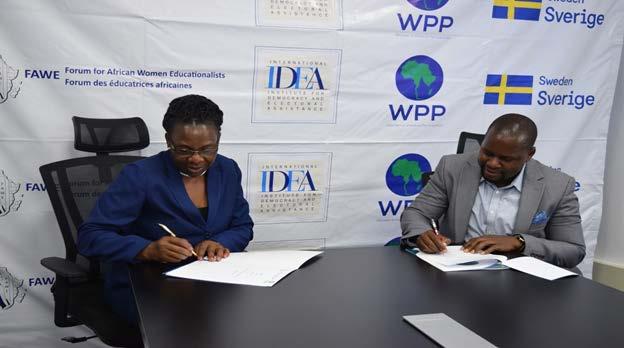
16 FAWE Annual Report 2021
FAWE Executive Director Ms. Martha R.L Muhwezi (left) and Oxfam Country Director Mr. John Kitui sign Memorandum of Understanding in October 2021 for a partnership to host the 3rd and 4th Women in Political Participation (WPP) Academies.
1.10 youth Empowerment through Sexual Education
Globally, sexual education and awareness continues to be recognized as a critical tool not only for youth empowerment, but also economic empowerment . FAWE has active projects on promoting SRHR rights of girls and young women including;
1.1.10.1 Break Free Alliance (BFA) project
BFA was launched in February 2021 with the main aim of ending child marriages and teenage pregnancies in Africa. FAWE works in a consortium with Plan International and Southern Africa Trust (SAT) and implementing the project in 9 countries: Kenya, Ethiopia, Niger, Sudan, Burkina Faso, Zambia, Malawi, Mali, and Mozambique. The project is supported by the Dutch government funds. As part of the project inception phase, FAWE, EACSOF Kenya and the EAC Gender Directorate validated the EAC Gender and Development Bill 2017 which was assented at the Heads of State Summit.
1.1.10. 2 Make Way Programme
FAWE is also a consortium partner in Make Way programme launched in 2021. The programme is running for five years (2021-2025) with the main aim to break barriers to SRHR by promoting a new way of looking at, and organising, SRHR issues, through an intersectional lens. This means, making overlapping vulnerabilities visible to understand their effects on people’s sexual reproductive health rights. Make Way develops innovative tools and builds capacities of other civil society organisations to advocate the needed policy and societal changes. This programme, also funded by the Dutch Government is being implemented in 5 countries Uganda, Zambia, Kenya, Ethiopia, and Rwanda. The consortium parterners are Wemos (Lead, VSO Netherlands Liliane Foundation, Akina Mama wa Afrika, The Circle of Concerned African Women Theologians.

17 FAWE Annual Report 2021
FAWE National Chapter and RS staff pose for a photo after the Break Free Alliance theory of change contextualization wokshop held in November 2021 in Nairobi Kenya.
1.1.10.3 Sexual health and Reproductive Education (ShARE)
The programme was officially launched in June 2021 with a focus on enhancing sexuality education among young people in Ghana and Uganda targeting primary and secondary schools. The programme is funded by Global Affairs Canada. FAWE is implementing the project in a consortium with Right to Play and Water Aid.
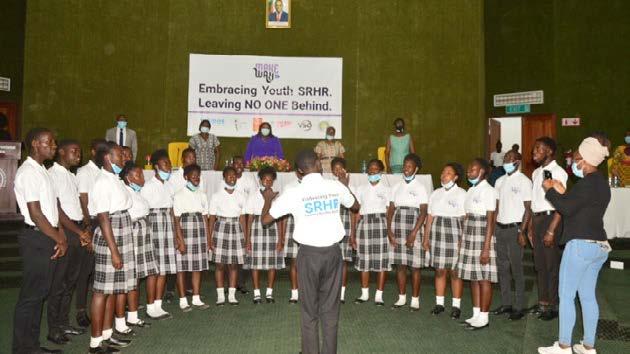
1.1.10.4
Tamatisha!
This project is funded by Ford Foundation is being implemented in partnership with Ewang’an Nadede Advocacy Initiatives (ENAI –Africa) in 5 counties (Kajiado, Nairobi, Machakos, Nakuru and Narok) in Kenya. The project aims at empowering teenagers to curb early pregnancies and advocate for gender responsive education policies at the county level towards retaining more girls in school.
18 FAWE Annual Report 2021
Secondary school students perform a song at the launch of the Make Way programme on 13th October 2021, in Lusaka, Zambia
1.1.10.5 Forum for African Women Educationalists Zambia Chapter (FAWEZA) launches the Make Way Programme
On 13th October 2021, the Forum for African Women Educationalists Zambia Chapter (FAWEZA) alongside other consortium partners under the Make Way project conducted a half day Programme launch at Mulungushi International Conference Center in a bid to build awareness and momentum behind the program.
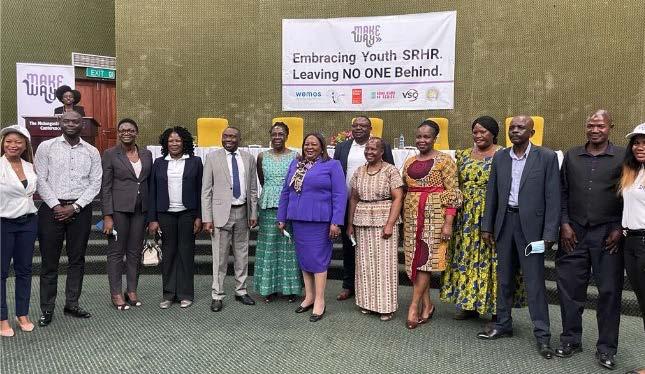
The launch was officiated by the Honorable Doreen Mwamba, the Minister of Community Development and Social Services. In attendance was FAWE Executive Director Ms. Martha Muhwezi, FAWE Deputy Executive Director Ms. Teresa Omondi-Adeitan, FAWE Zambia Board Chairperson Prof. Enala Mwase, representative for Her Royal Highness Chieftainess Mukamambo, representatives from the collaborating partners, students from the FAWE – Zambia School of Excellence, youth from the collaborating partners and other Civil Society Organizations (CSOs).
Speaking during the launch, FAWE Executive Director Ms. Martha Muhwezi expressed her excitement that the Make Way Programme had received overwhelming support from the government of Zambia since the first courtesy calls which were made by the Make Way Zambia team on the different line ministries in July 2021.
“The Consortium is privileged to work at a time when a new government has taken over and we look forward to a healthy working relationship. FAWE is committed to involving the relevant government line ministries at every level of implementation. Today’s launch is a momentum setter and a platform for the consortium partners to celebrate the gains made in putting up structure crucial for paving way for implementation.” She added.
In a recorded speech shared during the launch, Wemos Director Ms. Marielle Bemelmans stated, “There are
interesting developments in Zambia to learn from such as the progress in health services and the integrations of SRHR and an adolescent health road map yet there are still many challenges in reaching most vulnerable and Health education and in particular SRHR.”
Ms. Bemelmans further added that so far, a lot of work is being done in designing and developing the Make Way Programme such as analyzing the key stakeholders and looking at the most potent issues presenting an ambitious plan to strengthen the capacity to lobby and advocate for an improved access to SRHR and information.
The launch was characterized by an exhibition by the CCG members and the respective collaborating partners. The guest of honor visited all the stands and interacted with the CCG members.
In her speech, the Minister of Community Development and Social Services Hon. Doreen Mwamba (representing the Minister of Health) said, “The government of Zambia pledges to commit to ensuring that policies are in place to adequately address Sexual and Reproductive Health Rights (SRHR) services for young people in Zambia. We shall ensure that health personnel are adequately trained to professionally offer SRHR services to young people through the effective implementation of the youth friendly corners in the health facilities across Zambia.”
The Launch of the Make way program was a step in the right direction for a lot of marginalized youths in urban and rural areas, as the program will advocate for increased access to SRHR, create platforms for meaningful youth participation. The Zambian CCG was excited that this launch would create a very strong partnership with all stakeholders in the Implementation of the Make way program.
19
Minister of Community Development and Social Services Hon. Doreen Mwamba with the CCG members, Regional Officers, and partners during the launch in 2021
I NTE g RATI o N o F g EN d ER - RESP o NSI v E APPR o AC h ES IN E du CATI o N F o R TRANSF o RMATI v E S o CIETIES 2.0
Advocating for the integration of gender responsive approaches and policies in African education systems to inculcate skills and competencies in girls and women to enable them to contribute and transform their societies
2.1 girls taking their rightful place in STEM
Science, Technology, Engineering and Mathematics (STEM) is often an area that is associated with masculinity. Languages and humanities on the other hand are deemed as more appropriate for girls in school. FAWE, through her network continued to use multi stakeholder and multi-faceted approach including mentorship, exposition, sharing opportunities, encouraging female learners and teachers to take part in the special programs, building capacity in digital technologies and e-learning.
In 2021, with support from Dubai Cares, FAWE held the Annual STEM awards in Uganda for 40 best science teachers. The FAWE offline STEM portal was also installed in 17 schools in Uganda. Additionally, 21 National Chapters have been trained on digital pedagogy to enhance engagement of STEM education for girls. In Kenya and Nigeria, courtesy of Microsoft, 196 teachers and 5300 students were trained on digital skills and basic programming skills. ISDB supported Senegal and Togo to reach over 100 girls who benefitted from STEM remedial classes and mentorship from female scientists.
2.2 STEM teachers in uganda awarded
The Forum for African Women Educationalists (FAWE) Uganda Chapter on Saturday 27th March 2021 recognized and awarded 40 Science Teachers – teaching biology, chemistry, physics and mathematics with brand new laptops and scholastic materials to facilitate the teaching and learning process in their schools, bringing the total numbers of teachers awarded over the project period to 93. The awards are aimed at appreciating teachers for their outstanding performance and contribution to the body of science knowledge, inspiring and motivating other teachers to contribute towards developing and promoting science education in schools; creating school role models that interest girls to do STEM (Science, Technology, Engineering and Mathematics) subjects and later take-up Science career paths.
20 FAWE Annual Report 2021
“As Government we appreciate FAWE and Dubai Cares for implementing STEM intervention in Uganda. We supported this program right from inception because of the associated benefits and we call for its continuation to consolidate registered achievements.For girls to embrace science, we need to continue engaging parents, families and communities as they are the ones discouraging girls from climbing electricity poles. We lag as a country because we have not embraced science fully. It’s the reason why we are importing everything today including simple things that can be made here. The Government of Uganda noticed this and it’s the reason we are mainstreaming Science education now including an increased pay for teachers so that they are motivated to teach.” Mr. Arthur Makara, the Commissioner for Science Innovation and Outreach, Ministry of Science and Technology.
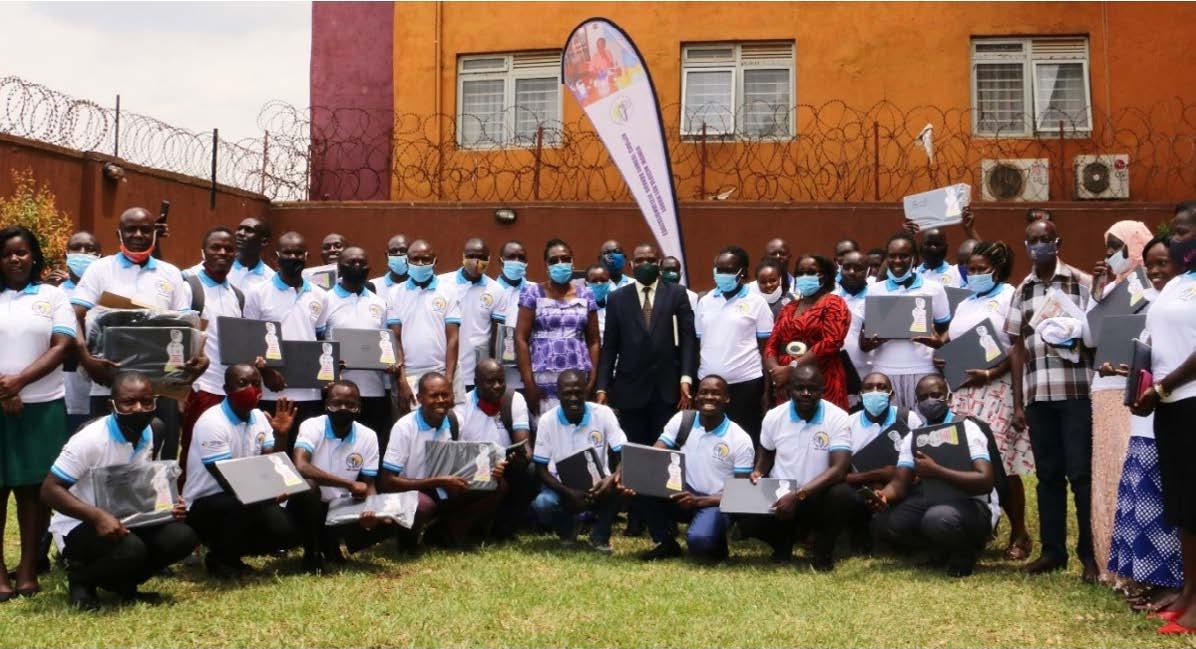
“Many girls are discouraged from doing Sciences because of the misconception that, they are meant for boys, which is wrong. It has been proven that each one of us, if given the opportunity and support, can do Sciences. For Instance, FAWE came in, motivated girls and supported schools to simplify the teaching of STEM subjects. The results now demonstrate that girls too can excel in sciences, following the increase in the number of girls enrolled in sciences and improved performance registered.” Ms. Martha Muhwezi, Executive Director, FAWE Africa.
To sustain the achievements realized, she called upon governments to increase funding and investment towards science education across all schools as science and innovation greatly contribute towards development of a country. For example, shortage of science teachers and lack of laboratory equipment and textbooks in schools need to be urgently addressed.
The teachers represented 40 project schools covering different regions and districts of
Y.Y Okot Memorial College in Kitgum, Moyo S.S, Semuliki High School in Bundibugyo, Karugutu S.S in Ntoroko, Kyebambe Girls School, Kangole S.S, Moroto high school, Katakwi high school, Mt of Olives College Kakiri, Mityana Secondary School, Kitante Hill School, Wanyange Girls’, and Iganga Girls’ Secondary School.
21 FAWE Annual Report 2021
Uganda;
Mr. Arthur Makara, the Commissioner for Science Innovation and Outreach, Ministry of Science and Technology (center in black suit), FAWE Executive Director Ms. Martha Muhwezi (center in purple) join the awarded teachers for a photo in Kampala, Uganda. Picture from FAWE newsletter March/April 2021.
Participants of the virtual FAWE Gender Responsive Pedagogy (GRP) training pose for a screenshot after a successful session in October 2021.

2.3 gender Responsive Pedagogy (gRP) and Tuseme Models
The FAWE GRP model aims at equipping educators with gender responsive pedagogical skills; to promote gender equity and equality in education. In a bid to promote self-assessment and for a wider reach across Africa, FAWE embarked on a journey to digitize the GRP manual including digitized GRP voice.
online gRP Training session for FAWE RS and WASRo staff

With support from IsDB (Islamic Development Bank), 40 teachers from Senegal and Togo were trained on GRP and Tuseme models. These are FAWE models used as empowerment frameworks to enhance social and psychological skills in young people with a specific focus on self-confidence. Over 90 education stakeholders from Burundi, DRC and Rwanda were trained on gender responsive pedagogy and 30 stakeholders from Burundi, DRC and Rwanda were trained on school related gender-based violence (SRGBV) to enable them mitigate risks and dangers that expose students to SRGBV. Similarly, under the GIZ project which focuses on the re-entry of teenage mothers back to school, a study on the impact of Covid-19 pandemic on school going girls in Uganda was conducted and findings disseminated to key stakeholders in 6 districts and schools. Parents, caregivers, religious and cultural leaders in the 6 districts were also sensitized on SRHR, early child marriage and sexual harassment. Currently FAWE Rwanda and Ministry of Education are creating media awareness on teen pregnancy and SRHR.
Staff members from the Forum for African Women Educationalists (FAWE) Uganda Chapter pose with Members of Parliament after a National Dialogue held to find practical solutions and end all forms of sexual and gender-based violence mated on girls and young women as a result of the outbreak of the COVID-19 pandemic in Uganda, December 2021.
FAWE Annual Report 2021
Advo CAC y AN d Po LIC y E N g A g EMENT 3.0
The year 2021 saw many African countries pick up the pieces from the wrath of 2020 COVID 19 pandemic. Most school children resumed their studies and most program had to be rejuvenated. FAWE continued to work together with her partners and key stakeholders in the Advocacy and policy engagement space to advance her mission of ensuring women and girls access affordable and quality education.
3.1 FAWE, a Pan-African thought leader
FAWE provided leadership in several international fora championing for education for girls in Africa. As the Chair of the Gender is my Agenda Campaign (GIMAC), FAWE officiated the 36th summit co-moderating the health and education session which resolved on enhancing governments support on girls’ health and education. FAWE leads the education thematic group of GIMAC which in the year focused on championing the need of African countries to honor the Kenyatta Declaration on adoption SRHR services and comprehensive sexuality Education in schools and adoption of new age methods of communication such as Facebook, Twitter and how these can be harnessed to provide education for the youth.
FAWE is also a member of the AU CESA Teacher Development Cluster and actively took part in the East and Southern Africa regional consultative meeting hosted by UNESCO on adult learning education; roundtable by UNICEF technical note on COVID 19 effect on Education and consultative webinar wit AU goodwill ambassador on ending child marriage.
3.2 Leveraging on partnerships to advocate for girl child education
As a way of promoting girls’ education and enhancing her place in the society, FAWE embarked on a series of media activities in 2021. Notably, FAWE’s Executive Director Ms. Martha Muhwezi participated in an interview coordinated by Mastercard Foundation and aired by CNBC Africa on enabling young women’s leadership
In commemoration of the Day of the African Child marked on 16th June, FAWE partnered with the ACERWC CSOs forum and The Center for Human Rights University of Pretoria to organize a regional webinar on accelerating the implementation of Agenda 2040. The webinar culminated in the release of a documentary on Her Stolen Childhood aimed at showcasing voices of child mothers in the continent. FAWE also made a presentation around SRGBV in the Global solutions webinar dubbed Preventing violence against children in and through schools.
As part of the International Day of the Girl celebrations, FAWE participated in the UNGEI East and Southern Africa Working group quarterly meeting and made a presentation on key CSOs opportunities for engagement at the AU CESA Cluster. FAWE got a chance to showcase her work on teenage reentry policies during the CESA meeting and partnered with UNICEF and UNHCR to host UNGEI cluster high level meeting where FAWE presented on education financing for girls.
FAWE in collaboration with FAWE Kenya facilitated 10 girls to participate in the pre-summit to the African Girls Summit (AGS). The Summit collected the voices of girls from across Africa and the outcome statement from the presummit was included in the main AGS. Similarly, FAWE mobilized 15 girls from Kenya to participate in the AU African Girls Summit Nhanga event organized by the AU goodwill ambassador on ending child marriage.
23 FAWE Annual Report 2021
The long-standing partnership between FAWE and the Global partnership for Education continued to thrive throughout the reporting year with FAWE organizing and coordinating a side event at the GPE/Global Education Summit in July at the invitation of GPE. The livestream recording of the event can be found here https:// youtu.be/wVE7zMiRi9Y and the call to action here: https://www.globalpartnership.org/users/balliance.
Additionally, FAWE participated in the 2021 blog series in collaboration with the Global Partnership for Education (GPE). The writers were mainly FAWE alumni, Staff, National Chapter staff, teachers, and partners. Click on the links below to view the FAWE sourced stories: https://linkmix.co/8681933
Girls from Turkana county in Kenya carry placards advocating for girls’ education after a four day workshop on the use of data for advocacy held in May 2021.

3.3 data driven Advocacy for girls in Emergencies (EiE)
FAWE trained 30 representatives from Women Rights organizations in Turkana and Eastleigh in Nairobi on the use of data for advocacy in a 4-day workshop held in May 2021.
Two working groups were formed during the training and advocacy plans developed to guide the organizations on influencing policies around girls’ education in emergencies. The working groups have also developed a prevention and management strategy for GBV in their areas. FAWE Kenya is now a member of Turkana Social Protection Group advocating for end of child marriages in Turkana.
Community members in Turkana county in Kenya pose for a photo after the workshop on the use of data for advocacy held in May 2021.

24 FAWE Annual Report 2021
I NSTIT u TI o NAL S TREN g T h ENIN g AN d C APACIT y Bu IL d IN g 4.0
For institutional growth, FAWE appreciates that it is important to have up to date working systems and adhere to the highest levels of corporate governance. Besides, it is mandatory to continuously build capacities of staff and ensure they are equipped with necessary tools and informed of the latest practices in their area of expertise. FAWE has set pace in improving access to financial resources and aligning with governments response mechanisms to meet the urgent education needs of girls in schools. FAWE has also improved collaboration with National Chapters in building their capacity in various programming areas including online pedagogy, emerging monitoring and evaluation trends, Advocacy skills, resource mobilization styles, communication techniques such as website management and development of communication strategies for increased visibility. The National Chapters are the back bone of FAWE; their strength is FAWE Africa’s strength.
4.1 Strengthened Capacity of FAWE National Chapters and Regional Secretariat Team
4.1.1 FAWE South Sudan (FAWE SS) is back!
FAWE SS was first established in 2008 and hosted at Ministry of Education South Sudan. Unfortunately, in 2013, FAWE SS encountered great difficulty because of the South Sudanese civil war. During this unrest, FAWE SS was forced to close as it could no longer function. What followed was the loss of registration status and an exacerbation of the negative situation facing out of schoolgirls in South Sudan.
In 2020, officials from the Ministry of Education and activists from NGOs working in South Sudan approached FAWE Regional Secretariat (FAWE RS) for support to revamp the chapter. Various planning meetings took place and on 6th of April

2021, FAWE SS was once again registered. Whilst congratulating the chapter, Ms. Martha Muhwezi the FAWE Africa Executive Director, thanked the MOE officials for their commitment to girls’ education and assured the officials and FAWE SS team, full support from FAWE Regional Secretariat.
FAWE South Sudan is back to addressing the continuing violations of girls’ and women’s rights in the Education sector. The Chapter is being steered by the National Coordinator Ms. Poni Tekla Gabriel. Congratulations! FAWE South Sudan
4.1.2 FAWE gRP training for FAWE Regional Secretariat Staff and National Chapters
New staff of FAWE Regional Secretariat and select national chapters staff (Senegal, Mali, Nigeria, Chad, Gabon, and Togo) were trained on GRP and how to use it in their programmes. The overarching objective of the training was to strengthen the capacities of FAWE staff on the GRP model for them to become GRP champions in areas of work as well as to be equipped as trainers of trainers. To achieve these objectives, participants discussed the demand and supply factors that impede gender equality in education.
25 FAWE Annual Report 2021
On the demand side, the sessions enabled participants to interrogate socio-cultural norms that disempower girls and women and result in gender disparities in education, which made them appreciate why gender inequality and exclusion persist in education.
On the supply side, the sessions looked at pedagogy in relation to classroom management, examining the efficacy of pedagogical practices; what is taught, how what is learnt is taught and how what is taught is learnt. Participants also came to a recognition that quality education would only be possible in schools that provide gender responsive school environments.
On the demand side, the sessions enabled participants to interrogate socio-cultural norms that disempower girls and women and result in gender disparities in education, which made them appreciate why gender inequality and exclusion persist in education.
On the supply side, the sessions looked at pedagogy in relation to classroom management, examining the efficacy of pedagogical practices; what is taught, how what is learnt is taught and how what is taught is learnt. Participants also came to a recognition that quality education would only be possible in schools that provide gender responsive school environments.
4.1.3 Technical training in website management and communications strategy development
FAWE conducted an online training session on basic website management skills and back-end navigation, for her 15 national chapters. The training was supported from funds by Echidna giving.
In a bid to streamline communication within FAWE Africa and beyond, 33 participants from FAWE National Chapters were trained on how to develop a communication strategy and use social media for programming. The communication strategy would serve as a blueprint for internal and external communications and increase visibility and awareness of FAWE activities.
4.1.4 Francophone spirit ignited in Anglophone Speakers
Fifteen (15) FAWE regional secretariat staff took up the challenge to learn French trained by Alliance Francaise. This was with the aim to keep up to language standard of FAWE as a regional and bilingual organisation. This turned out to be an exciting moment for the team. All the 15 staff passed the DELF A1 level with flying colors!
Immediately I joined FAWE I knew I had to learn French to enable me to effectively communicate with my Francophone finance counterparts especially when disbursing funds and following up financial reports
Catherine Mwangi, FAWE RS Financial Officer
I look forward to the day I will be proficient in French. I want to reduce the level of interpretation when communicating with FAWE Alumni from Francophone Countries
Julie Khamati, FAWE RS Programme Assistant
FAWE RS staff after sitting their DELF A1 French examinations at the Alliance Francaise de Nairobi in November 2021

26 FAWE Annual Report 2021
“ “ “
“
4.2 Resource Mobilization
With the continuous support and presence of our donors, FAWE has been able to assist thousands of girls and boys across the continent and work towards achieving its objectives of addressing girls’ education and leadership challenges across Africa.
In 2021, FAWE gained new partners including Ford Foundation on ending teenage pregnancies in Kenya, Oxfam Kenya on promoting women participation in politics in Kenya, French Embassy Senegal on promoting quality education for girls in Burkina Faso, Gabon and Senegal, Global Affairs Canada in promoting Sexual Reproductive Rights of Girls in Ghana and Uganda, Sexual Violence Research Initiative (SVRI), a research on sexual violence and So Green (Iceland) using carbon credits to reduce the number of teen pregnancies proposed for Zambia while exploring Sierra Leone, Burundi, Mali, Nigeria, Cameroon, Benin, Niger, Uganda, and Ethiopia. Ongoing efforts to bring more partners on board are in full gear for the year 2022.
Overall FAWE increased her financial resources by 33% compared to 2020. It is also important to note that 2020 audits conducted by Price Waterhouse Coopers were unqualified, confirming FAWE’s prudent use of her resources.
4.3 Communication for enhanced visibility
To enhance FAWE’s position as a thought leader in matters education for girls’ and women’s empowerment, FAWE continued to positively influence and shape opinions on girls’ education in Africa. This was achieved through strategic placement of opinion pieces in various media. One of the opinion pieces was dubbed the effectiveness of school re-entry policies for teenage mothers in Africa: What works? authored by Teresa Omondi – Adeitan, FAWE African Deputy Executive Director. The article was placed in the Nation Africa platform during the 16 Days of Activism against Gender Based Violence

FAWE also continues to produce bimonthly newsletters to inform her audience on the work of the organisation and invite stakeholder’s support on emerging issues. The newsletters also highlight FAWE success stories at regional and national Level.

27
FAWE Kenya officials, teachers and best students pose for a photo at the awarding ceremony of the Phase 3 STEM project. – Picture from FAWE Newsletter May/June 2021
FAWE’S oNLINE PRESENCE IN 2021
4.4 Alumni engagement
As FAWE sets her eyes on the future, she also remembers to reach out to the beneficiaries of the past. These are the girls and women who were supported by FAWE in one way or another to access education and other opportunities. It is imperative that FAWE keeps in touch with the alumni as they are the mentors and voices of hope that the beneficiaries of today need.
In a bid to reach out to and create links with alumni, FAWE in partnership with InHive carried out a survey and developed a recommendations report that detailed the views of different Alumni, RS and NC staff on their proposed support for strengthening of the FAWE alumni network. Implementation of the recommendations began in May 2021 with four consultative meetings held with Alumni executives from different chapters. Additionally, one alumnus, Ms. Bridget Akurut was selected to represent FAWE as a GPE Young Leader. This not only contributed to the alumnus’ exposure but brought FAWE’s voice into global campaigning.
On the 16th of June 2021, FAWE held an alumni webinar to discuss on the progress made in girl’s education over the past 30 years. The major focus was on the kind of pressures girls face to complete and transit to higher levels of education. During the webinar, the alumni were able to share their education and career journeys and ways to encourage other girls to perform well in school and transition to tertiary education and the world of work. Similarly, a virtual alumni webinar was held in November, where 30 alumni attended. The webinar was a precursor to the 16days of activism campaign and focused on the link between menstrual disorders and gender-based violence.

28 FAWE Annual Report 2021 www 54,500 6,910 449 183 Impressions on Twitter Profile visits Mentions new followers 400 809 250 239 post engagements page views new followers page likes 49,160 49,045 375,208 Users New users page views
As part of capacity building, 11 alumni representatives from 11 National Chapters were trained on alumni strengthening. The 11 trainees will act as trainers of trainees and will cascade the training to other alumni in the other National Chapters.
The FAWE Monitoring and Information System (MIS) was reviewed and a new feature to enable collection of data through mobile phones was incorporated. FAWE alumni from 11 National Chapters have updated their biodata on the MIS through computers/ mobile phones. The data has enabled FAWE engage better with the alumni. Efforts to mobilize other alumni are on-going.
As part of capacity building, 11 alumni representatives from 11 National Chapters were trained on alumni strengthening. The 11 trainees will act as trainers of trainees and will cascade the training to other alumni in the other National Chapters.
The FAWE Monitoring and Information System (MIS) was reviewed and a new feature to enable collection of data through mobile phones was incorporated. FAWE alumni from 11 National Chapters have updated their biodata on the MIS through computers/ mobile phones. The data has enabled FAWE engage better with the alumni. Efforts to mobilize other alumni are on-going.
4.4.1 FAWE alumni selected as gPE global youth Champion
26-year-old Bridget Akurut, a FAWE alumni from Uganda was selected as one of the 17 youth champions from Africa, Asia, and Latin America to partner with the Global Partnership for Education (GPE) to raise awareness of the barriers to education with an aim to influence the ambition of global leaders to finance education and development.

Bridget has been an advocate for girl’s education for over a decade and has a record of accomplishment of past and current engagements on youth empowerment. She is currently the Alumni Representative to the FAWE Africa General Assembly, a member of the Educate – Her Alliance, Youth leader in Archdiocese of Kampala among others. She strongly believes that education creates equal opportunities for both boys and girls.
The 17 youth leaders are young education activists based in GPE partner countries in Africa, Asia and Latin America are supporting GPE’s financing campaign to transform education systems in their countries and around the world.
In 2021, Bridget and the other youth leaders drawn from Kenya, Comoros, Zimbabwe, Honduras, Sierra Leone, Nigeria, Nepal and Afghanistan took part in several virtual events, and spoke up for education.

29 FAWE Annual Report 2021
Ms. Bridget Akurut (left), FAWE alumni and a GPE Global Youth Champion (Right) All the 17 GPE Global Youth Champions drawn from different countries around the globe
Photo credit: GPE
R ESEARC h AN d K N o WLE dg E M ANA g EMENT 5.0
In 2021, research and knowledge management continued to be an inherent part of FAWE’s strategic approach, with activities centering on: monitoring and evaluation, data management and Communications.
5.1 Enhancing data management
To ensure that there is data repository at FAWE, eight National Chapters were introduced to and currently utilize the FAWE Management Information System (MIS). The system is crucial for the coordination, control, analysis and visualization of information in FAWE. The MIS training helped the chapters to consolidate results for their projects as well as those funded through the regional secretariat. By a touch of a button, FAWE Secretariat is also able to get information from chapter level.
5.2 Research and documentation
5.2.1
higher education Access Program (hEAP)
FAWE conducted the midterm review of the Higher Education Access Program (HEAP) implemented by Forum for African Women Educationalists Uganda Chapter (FAWEU) in three universities and two technical colleges . The aim of HEAP is to provide access to higher education to student from 13 marginalized districts in Uganda. The programme allows the students to take up bridging courses that allow them to attain the points required for Degree courses. The midterm review showed the programmes recorded great success, with 10 students from first cohort already in employment. Majority of the students also prefer to work in their home district, a great achievement of this programme in getting marginalized communities are empowered. This project is ongoing to 2024.
5.2.2 Re-entry Studies and Policy Briefs in Namibia, Senegal, Tanzania and Malawi
In March 2021, FAWE launched research on assessing the effectiveness of reentry policies for teenage pregnancy in Malawi, Tanzania, Senegal, and Namibia. Findings of the research were documented and used to inform the development of policy briefs which were designed, published, and disseminated in the target countries.
5.2.3 Women in Political Participation Situation Analysis – Tanzania and Kenya
FAWE developed the WPP situational analysis research that advised on the status of women leadership in the Kenya and Tanzania and, later developed country-specific policy briefs for the two countries. The knowledge documents have been disseminated on different platforms to garner support for women to participate in politics.
30 FAWE Annual Report 2021
5.3 FAWE migrates to the cloud!

FAWE is in the clouds! In this era of digitalization, FAWE is aligned to current state of art technological evolutions. FAWE moved to cloud-based solutions that guarantee service availability and accessibility, mobility, unlimited storage, data security, realtime updates, improved communication, and collaboration. The investment on both Microsoft Office 365 (O365) and Microsoft Dynamics 365 Business Central (D365) have been a key success towards ensuring organizational activities continue uninterrupted all throughout the year.
D365 which consists of the financial system, HR management system, grants management, procurement, and self-service portals, has seen the automation of various processes within the organization that have improved on turnaround times of tasks been carried out.
O365 on the other hand, has greatly improved on collaboration within the organization by providing tools such as Microsoft Teams and SharePoint that allow for sharing of information and actively engaging online to ensure teams are able to work together irrespective of their location.
Moving to cloud-based solutions gives room for a more sustainable, secure, and accessible data storage while improving on real-time collaboration within the organization as well as with external partners. This initiative will foster more reactivity and efficacity in the conduction of FAWE’s daily activities and will guarantee safeguarding of the institutional memory.
31 FAWE Annual Report 2021
Photo credit: Stock image
L EARNIN g S FR o M 2021 6.0
The COVID 19 Pandemic remains a heavy burden in the implementation of programs and activities. Nevertheless, FAWE has developed and adopted various adaptability strategies/measures to conducting its mission and meeting its strategic objectives. One of the widespread adaptability measures has been to resort to online training sessions and meetings to keep activities successfully running as planned. To reduce and/or prevent online fatigue, FAWE continues to use interactive, collaborative, and co-creative online sessions to keep participants interested and achieve desired results.
Covid travel restrictions, also impacted on field visits. FAWE applied innovative ways of project monitoring and follow up on activities being implemented in National Chapters. There has been frequent catch up phone calls, online meeting with project beneficiaries and use of partners at country level as supplementary monitors.
FAWE also experienced delayed implementation of activities, example in countries where education
institution remained closed or had partial operations for the whole of the year 2021. FAWE had to seek for no cost extension spilling activities over to the year 2022. However, FAWE has employed mechanisms to ensure the planned activities and results are achieved.

Overall, FAWE pursued robust negotiations and updates with existing donors while attracting new development partner to sustain its programmes. Further, each National Chapter has been allocated a contact person from regional secretariat to enhance communication and support for programmes at National level. FAWE is also making deliberate steps in providing leadership by seating in important committees/working groups at African Union level and globally in education networks.
FAWE is optimistic that the year 2022 will witness more important strides and achievements, this of course with the continued support of our partners, unwavering commitment of our National Chapters and staffs at the regional secretariat.
32 FAWE Annual Report 2021
Photo credit: Stock image
















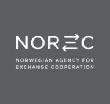
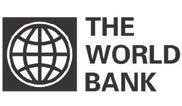
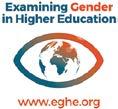













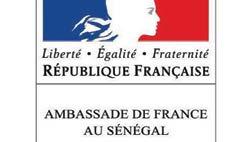


33 FAWE Annual Report 2021 FAWE Development
Strategic Partners
&

 Top left: Seaweed harvesting in Zanzibar in October 2021 as a result of the Youth Sustained Business Startups Project funded by Norad.
Bottom left: Beneficiaries of the Youth Sustained Business Startups Project work on a seaweed product in Zanzibar in October 2021. The project is funded by Norad.
Top left: Seaweed harvesting in Zanzibar in October 2021 as a result of the Youth Sustained Business Startups Project funded by Norad.
Bottom left: Beneficiaries of the Youth Sustained Business Startups Project work on a seaweed product in Zanzibar in October 2021. The project is funded by Norad.
Top
Bottom right: A beneficiary of the youth Sustained Business Startups project in Bamako Mali inspects a solar energy installation in November 2021. The project is funded by Norad.

 right: Beneficiaries of the Youth Sustained Business Startups Project work on a solar panel in Bamako, Mali during a practical lesson in November 2021. The project is funded by Norad.
right: Beneficiaries of the Youth Sustained Business Startups Project work on a solar panel in Bamako, Mali during a practical lesson in November 2021. The project is funded by Norad.
FAWE House | Chania Avenue, Off Wood Avenue Kilimani, P.O Box 21394 - 00505, Ngong Road, Nairobi, Kenya. +254 709 436 000 / +254 714 606 629 / +254 736 387 000
Email: fawe@fawe.org
www fawe org
36 FAWE Annual Report 2021
Forum for
FAWE Af rica @RsFawe
Af rican Women Educationalists































































 Top left: Seaweed harvesting in Zanzibar in October 2021 as a result of the Youth Sustained Business Startups Project funded by Norad.
Bottom left: Beneficiaries of the Youth Sustained Business Startups Project work on a seaweed product in Zanzibar in October 2021. The project is funded by Norad.
Top left: Seaweed harvesting in Zanzibar in October 2021 as a result of the Youth Sustained Business Startups Project funded by Norad.
Bottom left: Beneficiaries of the Youth Sustained Business Startups Project work on a seaweed product in Zanzibar in October 2021. The project is funded by Norad.

 right: Beneficiaries of the Youth Sustained Business Startups Project work on a solar panel in Bamako, Mali during a practical lesson in November 2021. The project is funded by Norad.
right: Beneficiaries of the Youth Sustained Business Startups Project work on a solar panel in Bamako, Mali during a practical lesson in November 2021. The project is funded by Norad.
